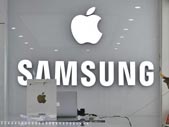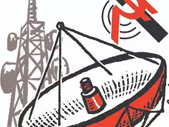|
|
Apple inks deal with Samsung to distribute iTunes shows on TVs
 Samsung Electronics Co Ltd said on Sunday that it will add an app to its smart televisions in the coming months to let owners watch content bought on Apple Inc's iTunes service, a possible first sign Apple is looking to distribute its forthcoming television service on devices made by others. Samsung Electronics Co Ltd said on Sunday that it will add an app to its smart televisions in the coming months to let owners watch content bought on Apple Inc's iTunes service, a possible first sign Apple is looking to distribute its forthcoming television service on devices made by others.
The deal is part of an ongoing strategy shift for Apple, which is facing weak hardware sales in China and a saturated global smart phone market where users are hanging on to their old iPhones longer than ever, hammering its biggest business.
As a result, Apple is increasingly leaning on its services segment, which includes businesses such as iCloud storage in addition to its music, television and movie content businesses.
It has announced several high-profile deals for original television content, including a forthcoming show with Oprah Winfrey, but has not yet said how it plans to distribute that content or when its service will launch.
The Samsung deal could be a step toward Apple distributing content to devices made by others. Apple makes a device called Apple TV that connects to a full television set, but has never produced a full set itself.
Under the deal unveiled on Sunday, Samsung will add an app to its televisions that lets users browse and play their existing iTunes movies and television shows as well as purchase or rent new content. Samsung also said it would add Apple's AirPlay 2 software that will allow iPhone owners to stream content from their device to Samsung televisions.
Many existing deals between content companies and smart television makers involve the content companies paying television makers for the right to appear on their devices. Apple and Samsung both declined to comment on whether Apple is paying any fees or a percentage of sales made on the televisions under the new deal.
The impact of iTunes landing on Samsung movies will be muted for now. Since late 2017, consumers who purchased movies through iTunes have been able to watch them on any device, including Samsung televisions, that supported the Movies Anywhere consortium.
Films from Warner Bros, Walt Disney, Universal, Sony and Fox purchased through iTunes, Amazon, Google Play and Vudu could be viewed on the respective apps and devices and TVs that support the apps.
The Samsung deal is the second time in recent months in which Apple has made a pact with another technology company to land its services on their devices. In November, it said its Apple Music streaming service would be made available on Amazon's Echo smart speakers, despite Apple selling its own line of HomePod speakers that compete directly with Echo speakers. (The HinduBusiness Line)
|
China's Huawei launches server chipset as it taps new growth channels
 Huawei Technologies Co Ltd on Monday launched a new chipset for use in servers, at a time when China is pushing to enhance its chip-making capabilities and reduce its heavy reliance on imports, especially from the United States. HuaweiTechnologies Co Ltd on Monday launched a new chipset for use in servers, at a time when China is pushing to enhance its chip-making capabilities and reduce its heavy reliance on imports, especially from the United States. Huawei Technologies Co Ltd on Monday launched a new chipset for use in servers, at a time when China is pushing to enhance its chip-making capabilities and reduce its heavy reliance on imports, especially from the United States. HuaweiTechnologies Co Ltd on Monday launched a new chipset for use in servers, at a time when China is pushing to enhance its chip-making capabilities and reduce its heavy reliance on imports, especially from the United States.
Huawei, which derives the bulk of its revenue from selling telecommunications equipment and smartphones, is seeking growth avenues in cloud computing and enterprise services as its equipment business comes under increased scrutiny in the West wary of Chinese government influence over the firm. Huawei has repeatedly denied any such influence.
Chinese firms are also seeking to minimise the impact of a trade dispute which has seen China and the United States slap tariffs on each other's technology imports.
For Huawei, the launch of the chipset - called the Kunpeng 920 and designed by subsidiary HiSilicon - boosts its credentials as a semiconductor designer.
The Shenzhen-based company already makes the Kirin series of smartphone chips used in its high-end phones, and the Ascend series of chipsets for artificial intelligence computing launched in October.
It said its latest 7 nanometre, 64-core central processing unit (CPU) would provide much higher computing performance for data centres and slash power consumption. It is based on the architecture of British chip design firm ARM - owned by Japan's SoftBank Group Corp - which is seeking to challenge the dominance in server CPUs of U.S. maker Intel Corp.
Huawei aims to "drive the development of the ARM ecosystem", said Chief Marketing Officer William Xu. He said the chip has "unique advantages in performance and power consumption".
Xu also said Huawei will continue its "long-term strategic partnership" with Intel.
Huawei on Monday also released its TaiShan series of servers powered by the new chipset, built for big data, distributed storage and ARM native applications.
The firm founded chip designer HiSilicon in 2004 to help reduce its reliance on imports.
In modem chips, Huawei internally sources 54 percent of those in its own devices, with 22 percent coming from Qualcomm Inc and the remainder from elsewhere, showed evidence presented at an antitrust trial for Qualcomm. (ETtelecom)
|
Do not extend deadline for implementing new FDI policy for e-commerce sector: CAIT
 Traders’ body CAIT on Sunday urged the Commerce and Industry Ministry not to allow private labels to be sold on e-commerce marketplaces and desist from extending the February 1 deadline for implementation of the changes to FDI policy for the e-commerce sector. Traders’ body CAIT on Sunday urged the Commerce and Industry Ministry not to allow private labels to be sold on e-commerce marketplaces and desist from extending the February 1 deadline for implementation of the changes to FDI policy for the e-commerce sector.
In a letter to the Secretary in the Department of Industrial Policy and Promotion (DIPP) Ramesh Abhishek, the Confederation of All India Traders (CAIT) requested him to make it explicitly clear whether private labelling or branding is allowed under the foreign direct investment (FDI) policy in the e-commerce sector.
‘Loopholes’
“It is submitted that if it (labelling) is allowed it will run contrary to the intention of the government to make e-commerce free from evils and malpractice and to provide an equal level playing field with fair competition. Such e-commerce companies will continue their ulterior motives through such loopholes as they are doing since last many years and small retailers will be killed,” CAIT alleged.
The government, earlier, had clarified that private labels were not banned from being sold on e-commerce marketplaces. One of the big players, however, stated that private labels are a small component of the business and that the government needs to address the larger issues at hand.
Private labels, often sold at lower prices, allow e-commerce companies to control quality and even offers better margins than big, established brands. Over the last few years, e-commerce players have introduced private labels across a variety of categories including apparel, home furnishing and grocery.
Large e-commerce marketplaces could approach the government seeking extension of the February 1 deadline as compliance with the recent changes would require at least 4-5 months at operational level, multiple sources said earlier.
However, in the letter to the DIPP Secretary, CAIT said it will strongly oppose any such extension. “The modus operandi of these e-commerce companies for seeking extension is to keep delaying fair execution of the policy and they may continue with their sinister designs of operating all kinds of malpractices,” it said. “Therefore, it is strongly submitted not to fall prey under malicious agenda of such e-commerce companies and no extension should be allowed under any circumstances,” the traders’ body claimed.
New rules
The government’s move to tighten norms has hit Amazon and Flipkart the hardest as the new regulations bar online marketplaces with foreign investment to sell products of companies where they hold stakes as well as ban exclusive marketing arrangements.
Another provision states that the inventory of a vendor will be seen as controlled by a marketplace, if over 25 per cent of the vendor’s purchases are from the marketplace entity, including the latter’s wholesale unit.
The move is aimed at ensuring that the marketplace entity or its related companies cannot control inventory under the FDI rules. (The Hindubusiness Line)
|
DoT’s request for formula irks Trai
 The telecom regulator is peeved at a request of the Department of Telecommunications (DoT) to explain the calculations that the watchdog has used to arrive at the starting price it has recommended for auctioning 4G and 5G airwaves. Senior officials at the Telecom Regulatory Authority of India (Trai) said DoT had exceeded its brief as per rules.
The telecom regulator is peeved at a request of the Department of Telecommunications (DoT) to explain the calculations that the watchdog has used to arrive at the starting price it has recommended for auctioning 4G and 5G airwaves. Senior officials at the Telecom Regulatory Authority of India (Trai) said DoT had exceeded its brief as per rules.
“Look at it from the legal point.
The Trai Act says the government will seek recommendations from the regulator, then if the government disagrees with the regulation, they would write back to the regulator, asking it to reconsider,” said an official.
“Now, the regulator can disagree or agree with the government. Then the government can decide whether they agree or they disagree with the regulator.
So, where does the question of ‘give us the rationale’ for our methodology or calculations come in,” the official said.
Another official said the entire mode of communication between Trai and DoT has been laid down in the Trai Act. “The relationship should be as clear as defined as under the Act”.
The internal Trai views come in the backdrop of a request from DoT, which seemed to raise doubts over the calculation of the reserve price of the airwaves, an exercise routinely undertaken by the telecom regulator.
While the top two telecom companies, Bharti AirtelNSE 0.79 % and Vodafone Idea, have called the proposed base auction prices high, Reliance JioInfocomm has backed the prices and said it was willing to buy airwaves at the earliest.
Explaining why the regulatory authority was stung by the department’s communication, the second official said: “It feels like the examiner has said, now you have submitted your answer sheet but we would also like to see the rough work behind the computation.
Excel sheets and working sheets accuracy needn’t be checked by the department.”
The official said Trai had submitted a 160-page recommendation, which had everything.
Amid this back and forth between DoT and the regulator, Trai has decided to start a consultation process to change the methodology to compute the starting price of bandwidth.
It proposes to take a lot more factors into consideration while calculating the price, including health of the industry.
The idea is to find ways to lower the base price at which bids will be sought in future auctions, moving away from its usual practice of mechanically hiking the starting price in every successive sale. Trai’s current methodology has resulted in the spectrum prices in India being among the highest in the world.
DoT has also discounted Trai’s views that there shouldn’t be any delay in auctioning the available spectrum, as it pushed back the auctions for multiple bands of 4G and 5G airwaves to the second half of 2019 — this means, the auction would happen almost a year after the regulator gave its recommendation.
The first official said the government must auction airwaves and not make the outcome of the auctions a matter of prestige. (Economic Times)
|
Telecom revenue mop-up slips 22% in FY18 as earnings take a hit
 The government’s revenue mop-up from the telecom industry fell by nearly 22% in FY18 due to a decline in service providers earnings from sale of services, amid a brutal tariff war, telecom minister Manoj Sinha told Rajya Sabha on Friday. Sinha said the industry’s adjusted gross revenue (AGR) fell 18.62% to Rs 1,30,844.9 crore in FY18 from Rs 1,60,787.9 crore in the previous fiscal, resulting in lower licence fees and spectrum usage charges (SUC), reflecting continuing financial stress. The government’s revenue mop-up from the telecom industry fell by nearly 22% in FY18 due to a decline in service providers earnings from sale of services, amid a brutal tariff war, telecom minister Manoj Sinha told Rajya Sabha on Friday. Sinha said the industry’s adjusted gross revenue (AGR) fell 18.62% to Rs 1,30,844.9 crore in FY18 from Rs 1,60,787.9 crore in the previous fiscal, resulting in lower licence fees and spectrum usage charges (SUC), reflecting continuing financial stress.
AGR is the revenue that telcos derive from access services. They pay 8% of AGR as licence fee and roughly 5% as SUC — the two key revenue streams for the government. Revenue from licence fee declined 18.12 % to Rs 10,670.6 crore in FY18, from Rs 13,032.9 crore in FY17. “SUC receipts have also declined due to declining AGR,” Sinha said in a written reply to a query in the House.
SUC dipped over 29% to Rs 4,983.75 crore in FY18, from Rs 7,048 crore in the FY17, the minister said.
Sinha also cited the earlier report of an inter-ministerial group (IMG) on stressed assets in the telecom sector, which had noted, “Increased competition in the sector and entry of a new operator (read: Reliance Jio) led to free promotional offers, triggering a downward trend of tariffs and consequent decline in revenues.”
Jio’s disruptive entry in September 2016 and its relentless pricing aggression had forced older incumbent carriers to match rates to hold on to customers, in turn, eroding their revenue and profits.
That led to big-ticket consolidation, culminating in the mega Vodafone-Idea merger last August, as well as exits of several fringe players who could not withstand the brutal price wars.
In this context, Sinha said “the IMG had noted financial stress for some operators had been caused by low operating cash flows over a number of years, inadequate equity infusion and debt that does not appear sustainable.”
However, the minister said the IMG report also noted the entire sector was not in financial stress, and accordingly, the primary solutions to current problems would have to come internally from the telcos as they remained liable to service debt taken by them.
Sinha’s comments in Parliament come less than two months after the embattled Vodafone Idea (VIL) under intense financial pressure, having posted a whopping Rs 4,974-crore loss in the September quarter, had raised concerns about its ability to service debt that has ballooned to over Rs 1.15 lakh crore.
Vodafone Idea chairman Kumar Mangalam Birla recently met top finance ministry officials, flagging off the company’s woes and warning of a default on spectrum related payments which fall due in March 2019.
PENALTY OF Rs 58 LAKH
Separately, the telecom minister said the government has initiated steps to rein call drops by slapping a penalty of Rs 58 lakh on telcos, including erstwhile Idea CellularNSE 1.10 % (which merged with Vodafone India in August 2018) and staterun Bharat Sanchar Nigam.
“A penalty of Rs 4 lakh was imposed on BSNL in the June quarter while Rs 12 lakh was slapped on Idea during the same quarter,” the minister said.
Elaborating on financial disincentives imposed by the regulator on non-complaint providers against prescribed call drop benchmarks, Sinha said during the March quarter, a Rs 3-lakh penalty was imposed on BSNL, Rs 10.5 lakh on Idea, Rs 22.5 lakh on Tata TeleservicesNSE 1.27 % and Rs 6 lakh on erstwhile Telenor India (which was acquired by Bharti AirtelNSE 1.10 % last May).
However, the minister added that the call drops situation had improved with augmentation of telecommunications infrastructure and an increase in the base stations count to 20 lakh from 8 lakh in calender 2014.
|
 Samsung Electronics Co Ltd said on Sunday that it will add an app to its smart televisions in the coming months to let owners watch content bought on Apple Inc's iTunes service, a possible first sign Apple is looking to distribute its forthcoming television service on devices made by others.
Samsung Electronics Co Ltd said on Sunday that it will add an app to its smart televisions in the coming months to let owners watch content bought on Apple Inc's iTunes service, a possible first sign Apple is looking to distribute its forthcoming television service on devices made by others.

 Huawei Technologies Co Ltd on Monday launched a new chipset for use in servers, at a time when China is pushing to enhance its chip-making capabilities and reduce its heavy reliance on imports, especially from the United States. HuaweiTechnologies Co Ltd on Monday launched a new chipset for use in servers, at a time when China is pushing to enhance its chip-making capabilities and reduce its heavy reliance on imports, especially from the United States.
Huawei Technologies Co Ltd on Monday launched a new chipset for use in servers, at a time when China is pushing to enhance its chip-making capabilities and reduce its heavy reliance on imports, especially from the United States. HuaweiTechnologies Co Ltd on Monday launched a new chipset for use in servers, at a time when China is pushing to enhance its chip-making capabilities and reduce its heavy reliance on imports, especially from the United States.
 Traders’ body CAIT on Sunday urged the Commerce and Industry Ministry not to allow private labels to be sold on e-commerce marketplaces and desist from extending the February 1 deadline for implementation of the changes to FDI policy for the e-commerce sector.
Traders’ body CAIT on Sunday urged the Commerce and Industry Ministry not to allow private labels to be sold on e-commerce marketplaces and desist from extending the February 1 deadline for implementation of the changes to FDI policy for the e-commerce sector.
 The telecom regulator is peeved at a request of the Department of Telecommunications (DoT) to explain the calculations that the watchdog has used to arrive at the starting price it has recommended for auctioning 4G and 5G airwaves. Senior officials at the Telecom Regulatory Authority of India (Trai) said DoT had exceeded its brief as per rules.
The telecom regulator is peeved at a request of the Department of Telecommunications (DoT) to explain the calculations that the watchdog has used to arrive at the starting price it has recommended for auctioning 4G and 5G airwaves. Senior officials at the Telecom Regulatory Authority of India (Trai) said DoT had exceeded its brief as per rules.
 The government’s revenue mop-up from the telecom industry fell by nearly 22% in FY18 due to a decline in service providers earnings from sale of services, amid a brutal tariff war, telecom minister Manoj Sinha told Rajya Sabha on Friday. Sinha said the industry’s adjusted gross revenue (AGR) fell 18.62% to Rs 1,30,844.9 crore in FY18 from Rs 1,60,787.9 crore in the previous fiscal, resulting in lower licence fees and spectrum usage charges (SUC), reflecting continuing financial stress.
The government’s revenue mop-up from the telecom industry fell by nearly 22% in FY18 due to a decline in service providers earnings from sale of services, amid a brutal tariff war, telecom minister Manoj Sinha told Rajya Sabha on Friday. Sinha said the industry’s adjusted gross revenue (AGR) fell 18.62% to Rs 1,30,844.9 crore in FY18 from Rs 1,60,787.9 crore in the previous fiscal, resulting in lower licence fees and spectrum usage charges (SUC), reflecting continuing financial stress.






